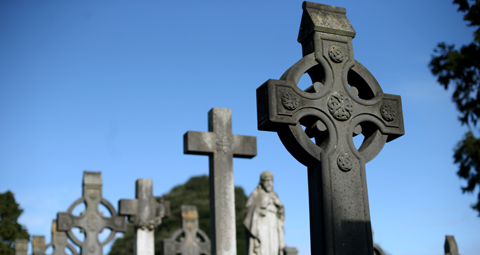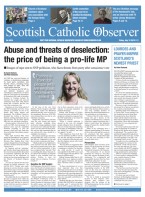BY Peter Diamond | May 10 2019 | ![]() 0 COMMENTS
0 COMMENTS ![]() print
print

Role for the Church in Gaelic revival
Publication Date: 2019-05-10
Plans are being put in place to form a Gaelic Catholic Society to help revive and preserve Scotland’s traditional language and culture.
The plans, which have been given tentative support by senior clergy, were proposed following a conference held on May 4 in Aberdeen Diocese that looked at ‘Faith in the North’ and the Church’s role in Scottish culture.
Andreas Wolff, a BBC Alba journalist and columnist for the SCO, spoke at the Pluscarden conference and proposed the formation of a Gaelic Catholic Society with involvement from priests, more regular Masses in the Gaelic language, and training for clergy. There are hopes any venture could win financial backing from the Scottish Government.
However, one Gaelic speaking priest has expressed scepticism about the initiative and cautioned about the risks of ‘cultural tokenism.’
Funding
Speaking after the conference, Mr Wolff said other Christian Churches in Scotland, including the Kirk, have Gaelic bodies which receive funding from the Scottish Government’s Bòrd na Gàidhlig, including for language training for clergy, and he advocated that the Church should seek similar funding.
He suggested that the society could set up online training resources ‘such as sound files of Mass and popular prayers in Gaelic’ for both priests and laity.
“The society could look at whether Gaelic training courses for priests can be run in conjunction with other churches or if this isn’t practical we could run our own, even at the seminary in Rome if the Bishops’ Conference approved,” he said.
Bishops’ backing
The rector of the Scots College, Fr Dan Fitzpatrick, told the SCO the plans could be considered if backed by the Bishops’ Conference.
“There is obviously a Gaelic revival in Scotland with the Gaelic Medium schools, which have the backing of the government and I know some Catholic families who send their children to those schools and speak highly of them,” Fr Fitzpatrick, who studied Gaelic at school, said.
Welcomed across Scotland
Fr Joseph Walsh, assistant priest at St Andrew’s Cathedral in Glasgow, also said there would be ‘no objections’ to hosting a Gaelic Mass in the city, where many Gaels from the Isles study and work.
“We host different Masses from a number of different organisations and I’m sure there would be no objection to hosting a Gaelic Mass, they would just need to let us know well in advance,” he said.
One priest of Argyll and the Isles, who has recently returned from decades of missionary work in Ecuador, has also expressed interest in the revival plan.
Fr Colin MacInnes, parish priest of St Mary’s Church Benbecula, said: “There is a lot that can be done to help revive Gaelic within the liturgy.
“There are bodies out there like Bord na Gàidhlig who can offer great support. We have to move and request it. I have two Gaelic Masses per month which are entirely spoken and preached in Gaelic.”
Scepticism
However, another priest in the diocese has said plans are already underway to update use of the language within churches in the Isles and expressed scepticism about the new initiative.
Fr Ross Crichton, parish priest of St Michael’s Church Eriskay, said: “Work is underway in updating our Gaelic prayer resources and hymn books, some of which haven’t been updated since the 1960s or before the Second Vatican Council.
“Although there are substantial pockets of Gaelic speakers on the mainland, there are seven parishes in the diocese where Gaelic is used habitually—principally in the Western Isles— and there are only four active priests from the diocese who can speak the language fluently.
“After 13 years of priestly ministry in the islands, Gaelic is very much part of my daily life and pastoral work.
“When Mass is celebrated in Gaelic, there is sometimes a lack of confidence in saying the responses, especially among the younger generation.
“If Gaelic is used as the language of private devotion at home, it will provide a stronger foundation for using the language in a communal liturgical context.
“A Gaelic Catholic Association would need to be clear about its aims and purpose so that it would not take away from work already being done by reinventing the wheel or drawing away human and financial resources from what is already a fragile situation.”
Tough to learn
He stressed that Gaelic courses for priests already exist and that ‘much of what is specific to pastoral ministry in Gaelic can only be learned in a parish setting where the language is used’ and that ‘a language cannot be learned overnight.’
He added that the Church’s primary role is to ‘preach the Gospel and minister to people’ and that to ‘promote the language where it is neither spoken nor understood risks descending into the realms of cultural tokenism.’
“The language should certainly be used to promote the Faith, but to use the Faith to promote a cultural, linguistic or even political agenda would seem to me as a priest to be a wrong ordering of priorities,” he said.
Bishops
The current and former bishops of Argyll and the Isles expressed tentative interest in the plan. Bishop Brian McGee said he was ‘broadly supportive of the Gaelic language in the liturgy’ though unaware of the new proposal.
“The priests serving the Isles are the ones at the coal face of the subject and I have appointed Fr Ross Crichton to begin to bring in a new prayer book and hymnal that would update and bring together all the resources so that they can deepen people’s prayer life,” he said.
Bishop Joseph Toal of Motherwell Diocese, previously of Argyll and the Isles, said: “I think it’s good that people are talking about it and I wish them well in any venture.”
Bishop Hugh Gilbert’s Aberdeen Diocese hosted the Faith in the North conference. He said its aim was to ‘revive awareness of the Catholic element in two main ‘cultures’ of northern Scotland: the Nordic and the Gaelic, and hopefully to begin a movement of reconnection.’
Bishop Gilbert said his opinion of Mr Wolff’s proposals was that ‘at this stage, the proposal should be developed. The laity must take the initiative.’
To find out more about the proposed Gaelic Catholic Society contact Andreas Wolff at [email protected].










